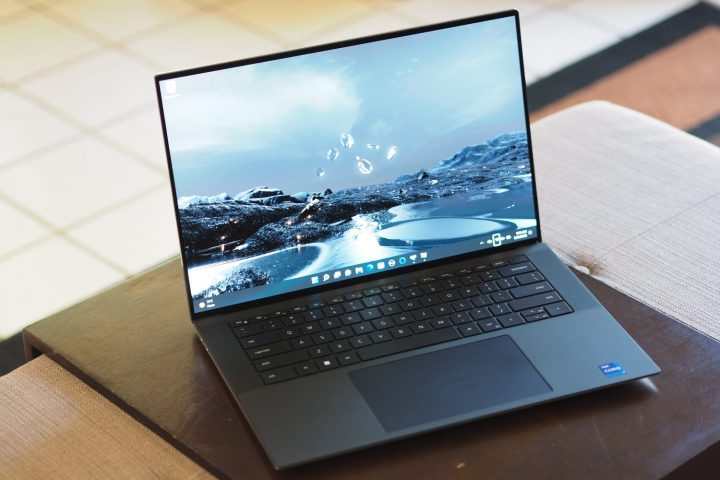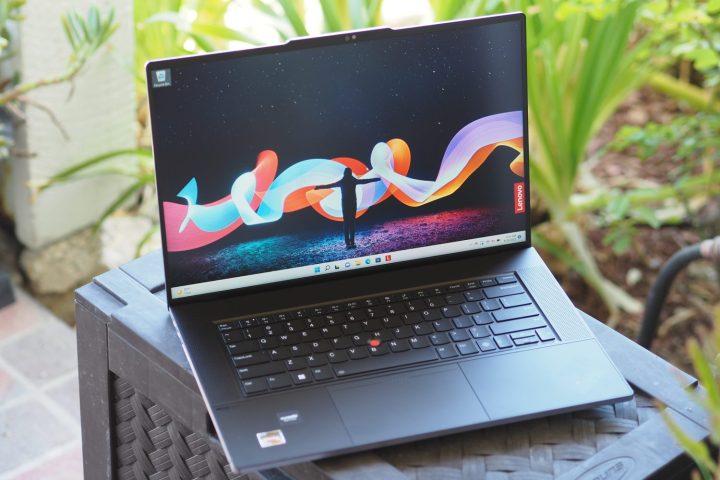The thin-and-light 15-inch laptop class is attractive for creators and power users who don’t want the absolutely largest machines to lug around. The Dell XPS 15 has led the class for some time now, and it’s one of the best laptops you can buy.
Lenovo’s new ThinkPad Z16 takes the ThinkPad line in a new, more modern direction, offering a few interesting features that the XPS 15 lacks. Are they enough to dethrone the king?
Specs and configurations
| Lenovo ThinkPad Z16 | Dell XPS 15 9520 | |
| Dimensions | 13.95 inches x 9.35 inches x 0.63 inches | 13.56 inches x 9.06 inches x 0.73 inches |
| Weight | 3.99 pounds | 4.22 pounds (non-touch) 4.62 pounds (touch) |
| Processor | AMD Ryzen 5 PRO 6650H AMD Ryzen 7 PRO 6850H AMD Ryzen 9 PRO 6950H |
Intel Core i5-12500H Intel Core i7-12700H Intel Core i9-12900HK |
| Graphics | AMD Radeon Graphics AMD Radeon RX6500M |
Intel UHD graphics Intel Iris Xe graphics Nvidia GeForce RTX 3050 Nvidia GeForce RTX 3050 Ti |
| RAM | 16GB LPDDR5 32GB LPDDR5 RAM |
8GB DDR5 16GB DDR5 32GB DDR5 64GB DDR5 |
| Display | 16-inch 16:10 WUXGA (1,920 x 1,200) IPS non-touch 16-inch 16:10 WUXGA (1,920 x 1,200) IPS low-power touch 16-inch 16:10 WQUXGA (3,840 x 2,400) OLED |
15.6-inch 16:10 Full HD+ (1,920 x 1,200) IPS 15.6-inch 16:10 3.5K (3,456 x 2,160) OLED 15.6-inch 16:10 UHD+ (3,840 x 2,400) IPS |
| Storage | 512GB PCIe Gen4 SSD 1TB PCIe Gen4 SSD 2TB PCIe Gen4 SSD |
512GB PCIe 4.0 SSD 1TB PCIe 4.0 SSD 2TB PCIe 4.0 SSD |
| touch | Optional | Optional |
| Ports | 2 x USB-C 4.0 1 x USB-C 3.2 Gen 2 1 x 3.5mm audio jack 1 x full-size SD card reader |
1 x USB-C 3.2 Gen 2 2 x USB-C with Thunderbolt 4 1 x 3.5mm audio jack Full-size SD card reader |
| Wireless | Wi-Fi 6E and Bluetooth 5.2 Optional LTE WWAN |
Wi-Fi 6E and Bluetooth 5.2 |
| Webcam | 1080p with infrared camera for facial recognition | 720p with Windows 11 Hello infrared camera |
| Operating system | Windows 11 | Windows 11 |
| Battery | 72 watt-hours | 86 watt-hours |
| Price | $1,424+ | $1,449+ |
| rating | 4 out of 5 stars | 4.5 out of 5 stars |
The laptops start at around the same price, with the entry-level ThinkPad Z16 costing $1,424 for an AMD Ryzen 5 PRO 6650H CPU, 16GB of RAM, a 256GB SSD, a 16-inch 16:10 Full HD+ (1,920 x 1,200) IPS display, and AMD Radeon integrated graphics. For $1,449, you get an XPS 15 with an Intel Core i5-12500H CPU, 8GB of RAM, a 512GB SSD, a 15.6-inch 16:10 Full HD+ IPS display, and Intel Iris Xe integrated graphics. So it’s a trade-off between RAM and storage with each laptop’s low-end model.
For $2,482, the ThinkPad Z16 comes with a Ryzen 9 PRO 6950H CPU, 32GB of RAM, a 1TB SSD, a 16-inch 16:10 4K+ (3,840 x 2,400) OLED display, and AMD Radeon RX 6500M discrete graphics. The XPS 15 tops out at $4,629 for a Core i9-12900HK CPU, 64GB of RAM, an 8TB SSD, an Nvidia GeForce RTX 3050 Ti GPU, and a choice between a 4K+ IPS panel or a 3.5K (3,456 x 2,160) OLED display .
The XPS 15 can be configured as a more powerful laptop, and you’ll pay the price.
Design
- 1.
Dell XPS 15 - 2.
Lenovo ThinkPad Z16
The ThinkPad Z16 departs considerably from the iconic black-on-black ThinkPad aesthetic, with a silver lid and chassis bottom that more closely resembles the XPS 15 than another ThinkPad. Open the lid and you’ll find a black palm rest and keyboard deck with the red TrackPoint nubbin, but the XPS 15 also has the same kind of black interior (although in the XPS 15’s case, it’s constructed of carbon fiber). The lines are different, with the ThinkPad Z16 being boxier and the XPS 15 being more streamlined, but these two sleek and attractive laptops have more similarities than differences. The ThinkPad Z16’s reverse notch that accommodates a 1080p webcam (compared to the XPS 15’s 720p version) stands out most.
They’re both built well, too, with solid all-aluminum chassis and lids that don’t give in to flexing, bending, or twisting. The hinges on both open smoothly with one hand and hold the lids in place. They’re equally solid premium laptops.
They also boast tiny display bezels, both affording a greater than 90% screen-to-body ratio that allows for minimal chassis size. The ThinkPad Z16 is just slightly deeper thanks to its larger 16.0-inch display versus the XPS 15’s 15.6-inch panel, but it’s thinner at 0.63 inches versus 0.73 inches and lighter at 3.99 pounds versus 4.62 pounds. The XPS 15 definitely feels denser than the ThinkPad Z16, but they are nicely sized machines given their larger displays.
The ThinkPad Z16’s keyboard looks a lot like the standard ThinkPad with its sculpted keycaps and plenty of spacing, but it’s lighter than usual with a snappier feel. It’s just as good as the XPS 15’s version, which also has nice keycaps and key spacing. Typing on both laptops is a breeze. The ThinkPad Z16 has a smaller touchpad than the XPS 15’s massive surface, but it’s also a haptic touchpad that provides feedback and clickability across the entire surface. An odd strip along the top is set up to support the TrackPoint buttons, but it’s easy enough to work around. The XPS 15’s touchpad has a nice mechanical feel, but the ThinkPad Z16’s haptic version is better.
Both laptops come with the same number of USB-C ports, but the XPS 15 supports Thunderbolt 4 thanks to its Intel chipset. Both have full-size SD card readers, which is a plus for creators, and both have the latest in Wi-Fi and Bluetooth. The ThinkPad Z16, though, offers LTE 4G WWAN, which the XPS 15 lacks.
Performance
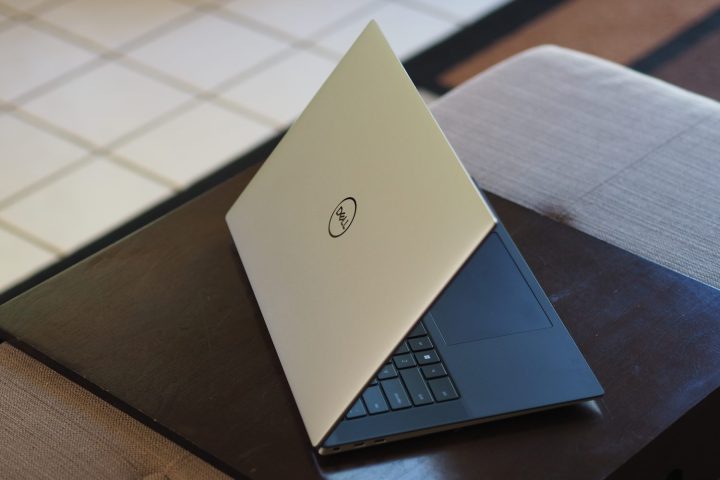
The ThinkPad Z16 is built around AMD’s 6000-series Ryzen PRO processors, and we reviewed it with the 8-core/16-thread Ryzen 7 PRO 6850H CPU running at 45 watts. The XPS 15 can be equipped with up to the 45-watt Intel 12th-gen Core i9-12900HK with 14 cores (six Performance and eight Efficient) and 20 threads, and we reviewed the laptop with the 45-watt Core i7-12700H with the same number of cores and threads and slower Turbo frequency of 4.7GHz versus 5.00GHz.
The two laptops were closely matched in multi-core performance (except for Geekbench 5), especially when the XPS 15 was in its performance mode. The XPS 15 was faster in single-core benchmarks, though, and our review unit was equipped with the RTX 3050 Ti GPU, so its gaming and creativity performance was faster. At the high end, the XPS 15 would likely be faster, but that’s not something we were able to test.
Both laptops are fast for demanding productivity workflows, but as configured, the XPS 15 will be faster running apps that can use the GPU, like Adobe’s Creative Suite.
| Lenovo ThinkPad Z16 (Ryzen 7 PRO 6850H) |
Dell XPS 15 9520 (Core i7-12700H) |
|
| Geekbench 5 (single / multiple) |
Bal: 1,360 / 8,648 Perf: 1,365 / 8,679 |
Bal: 1,470 / 9,952 Perf: 1,714 / 11,053 |
| Handbrake (seconds) |
Bal: 88 Perf: 87 |
Bal: 100 Perf: 77 |
| Cinebench R23 (single / multiple) |
Bal: 1,376 / 10,938 Perf: 1,374 / 11,553 |
Bal: 1,509 / 11,578 Perf: 1,806 / 13,313 |
| 3DMark Time Spy | Bal: 2,763 Perf: 2,860 |
Bal: 4,470 Perf: 4,520 |
Display
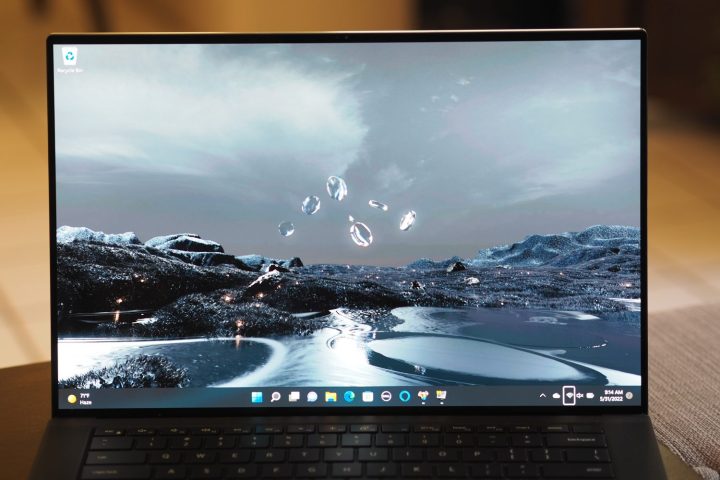
The ThinkPad Z16 offers a variety of excellent displays, up to a 4K+ OLED panel that we’re sure is spectacular. We reviewed it with the low-end (and low-power) Full HD+ IPS panel, and while it was brighter than the XPS 15’s 3.5K OLED display that we tested, it couldn’t keep up in any other metrics.
Both displays were fine for productivity work, but if you’re a creator or want the best media consumption experience, then you’ll want to upgrade the ThinkPad Z16 to its OLED panel.
| Lenovo ThinkPad Z16 (IPS) |
Dell XPS 17 9520 (OLED) |
|
| Brightness (nights) |
485 | 391 |
| AdobeRGB gamut | 100% | 100% |
| sRGB gamut | 77% | 97% |
| Accuracy (DeltaE, lower is better) |
2.37 | 0.42 |
| Contrast ratio | 1,520:1 | 28,130:1 |
Portability
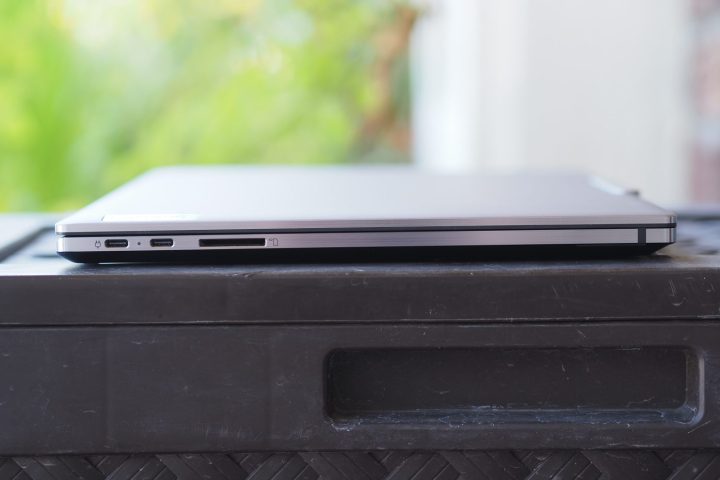
The AMD Ryzen line of CPUs is more power-efficient than Intel’s 12th-gen CPUs, which showed up in our battery benchmarks. Even though the ThinkPad Z16 had a smaller 72 watt-hour battery compared to the XPS 15’s 86 watt-hour battery, it managed longer battery life in both our web-browsing and video-looping tests. That can also be written off to the ThinkPad’s low-power Full HD+ display compared to the XPS 15’s higher-resolution and more power-hungry OLED panel.
Equip them with more similar displays, and these results would be very different. In that case, the ThinkPad Z16 would benefit from a larger battery.
| Lenovo ThinkPad Z16 (Ryzen 7 PRO 6850H) |
Dell XPS 15 9520 (Core i7-12700H) |
|
| Web browsing | 12 hours, 4 minutes | 9 hours, 38 minutes |
| I see | 13 hours, 2 minutes | 12 hours, 40 minutes |
The XPS 15 remains the best 15-inch laptop
Performance is similar, and the battery life might even favor the XPS 15 if both laptops are equipped with OLED displays. They’re both well-built laptops that look more alike than different, and they both have excellent keyboards. The ThinkPad Z16 has a better haptic touchpad and offers always-connected WWAN.
But in the end, the XPS 15’s overall design is more cohesive, and it’s faster. You’ll pay for the privilege, but the XPS 15 holds on to its place as the best 15-inch-class laptop.
Editors’ Recommendations
